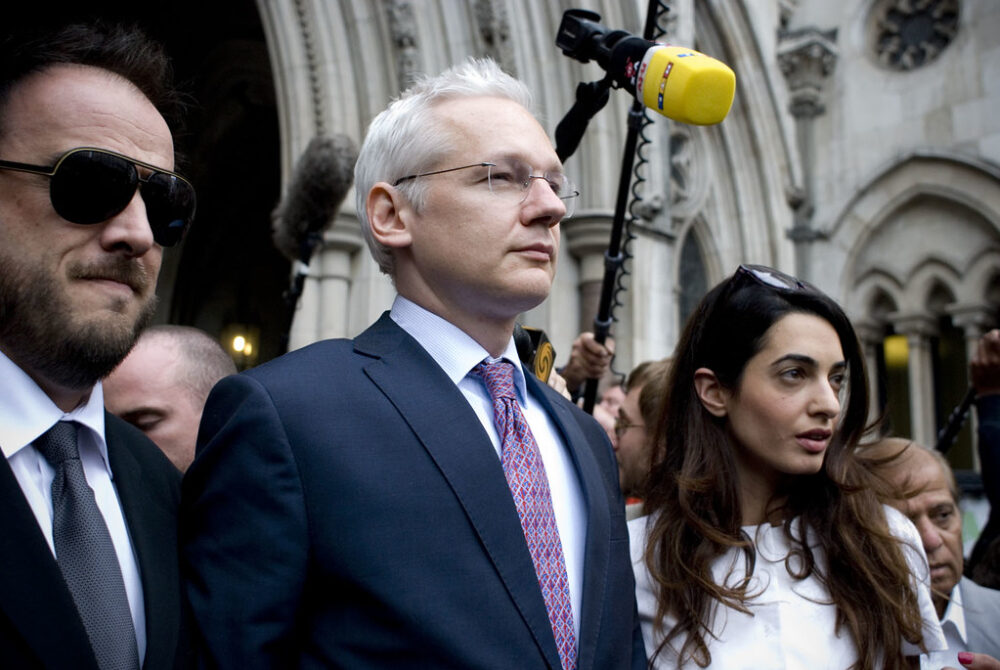Democrats responded to Trump’s brash attacks on the media by making press freedom a pet cause. With Julian Assange’s extradition to the US now cleared, Biden’s White House has demonstrated the hollowness of their rhetoric, persecuting a journalist whose important work has shone a light on the dark heart of American empire.
A computer hacker in his youth, the Australian born Assange came to international attention in the early 2000s by founding Wikileaks – a website dedicated to publishing classified government documents. Assange was inspired by Daniel Ellsberg’s publishing of the Pentagon Papers following the Vietnam War, which revealed the previously unreported scope of US attacks on North Vietnam during the conflict. Like Ellsberg’s, the work of Assange came to reveal the true extent to which the American government is willing to lie to its people to hide their morally bankrupt agenda. As was the fate of Ellsberg too, Assange’s plight would land him in direct confrontation with the full brunt of the state.
In July of 2010, Wikileaks first made headlines by publishing 90,000 documents exposing US war crimes in Afghanistan. These leaks revealed the staggering number of civilian casualties linked to the US’ military presence in the region, from indiscriminatory shootings of innocents by CIA paramilitary squadrons to the countless lives lost in airstrikes. One chilling account told of a deaf and mute Afghan civilian named Shum Khan, who was shot at by US troops as he fled from them on foot. Another recorded an incident where US Marines opened fire on unarmed civilians after witnessing a suicide bombing in Shinwar, killing 19 and wounding 50.
Just months later in October, Assange was implicated in the largest leak in American military history, publishing the now infamous Iraq Logs. The logs brought into even starker clarity the immense human cost of the US’ imperialist wars, revealing that out of the 109,000 lives lost during the Iraq War, 66,081 were civilians. Testament to this staggering statistic was leaked footage of a US Apache helicopter gunning down eleven Iraqi civilians, two of which were Reuters journalists. Replayed ad infinitum on major news outlets, the video provided the public with an uncensored depiction of the brutality of American troops overseas, continuing to shift the narrative on an increasingly unpopular war.
The US’ civilian body count in Iraq was not the only war crime unveiled in the logs. Documents also confirmed that Western Coalition forces routinely handed off prisoners to the Iraqi ‘Wolf Brigade’: a commando police unit notorious for their use of torture. This blatant disregard for human rights was all but formal policy for the US, with the Guardian claiming the logs showed that authorities failed to investigate hundreds of instances of abuse, torture, and murder by Iraqi security forces. Revelations such as these continued to challenge the US’ status as moral paragon, as well as the humanitarian pretences by which the country invaded the region.
Wikileaks continued to make waves in 2011 by publishing nearly 800 classified documents on the US’ Guantánamo Bay detention camp in Cuba. Despite the American government’s claims to the contrary, the Guantánamo Files revealed that many of the facility’s captives were not dangerous militants, emphasising the US’ agenda of detaining individuals merely to extract information. Indeed, the documents showed that Guantánamo Bay had imprisoned over 150 innocent Afghans and Pakistanis without formal charges. Rather, justification for the detainment of prisoners in Guantánamo Bay relied on specious evidence extracted from others in the facility, often those who had undergone torture.
Perhaps the most explosive revelation to emerge from the Guantánamo Files was that the US had detained Al Jazeera journalist Sami al-Hajj for nearly six years to provide intelligence on the news outlet’s activities. Al-Hajj would go on to allege that during his period of imprisonment he was subject to physical and sexual abuse.
Crucially, Wikileaks was just one of many media outlets to circulate the human rights abuses alleged in the Guantanamo Files. Like the Afghanistan leaks and Iraq War Logs before it, Assange’s revelations received extensive coverage from mainstream news organisations such as The Guardian and The New York Times.
While Assange’s journalism rendered him a household name, his fame came at a cost. Following Sweden issuing an international arrest warrant for sexual misconduct, Assange breached the conditions of his bail to seek asylum in the Ecuadorian Embassy in London in 2012. Assange did so claiming that the charges in Sweden were merely a pretence for extradition to the US, where he would be tried for his role in publishing classified materials. With his request for asylum accepted on the grounds of political persecution, the embassy became Assange’s home for seven years.
Throughout Assange’s exile, Wikileaks continued to shed light on the corrupt core of the American political system. During the 2016 Democratic primaries, the organisation released documents implicating the Democratic National Committee (DNC) in conspiring against Senator Bernie Sanders’ presidential campaign. Leaked emails revealed how supposedly impartial DNC executives expressed concern over the Sanders’ campaign and discussed how to advance Hilary Clinton’s bid for the nomination. A later round of leaks confirmed the DNC’s bias, showing that former Chair Donna Brazile had provided the Clinton campaign with debate questions ahead of a CNN Town Hall.
In 2019, Assange was stripped of Ecuadorian citizenship and subsequently arrested by British police for contravening the Bail Act. Shortly after beginning his sentence in London’s Belmarsh Prison, the US charged Assange with violating the Espionage Act of 1917. What began thereafter was a lengthy legal process to determine whether Assange could be rightfully extradited to the US. While initially District Judge Vanessa Baraitser denied the US government’s request, on the 10th of December 2021 Britain’s Court of Appeals ruled in their favour.
Amidst pursuing Assange’s extradition, Biden’s administration has boldly proclaimed itself a defender of journalistic freedoms. Earlier this year, the president remarked in a statement released on World Press Freedom Day that journalists play an indispensable role in democracies by checking abuses of power and demanding transparency. Biden has also been vocal about the Chinese Communist Party’s suppression of journalists, admonishing Beijing in June for ‘wielding its power to suppress independent media and silence dissenting views’.
However, Biden’s messaging on press freedoms has been just that: messaging. In choosing not to break with the Trump administration’s decision to extradite Assange, Biden has destroyed any credibility his rhetoric might have possessed. While Assange should be considered far from a hero, his persecution nonetheless constitutes the greatest assault on the free press in recent memory. It sets an immensely harmful precedent – that the US can simply lock up any journalist who publishes its state secrets. In exposing the violence and corruption covered up by the US at home and abroad, Assange has set himself apart as one of the most important journalists of our time – one whose freedom must be vociferously defended.
“Julian Assange” by acidpolly is licensed under CC BY-NC-SA 2.0







